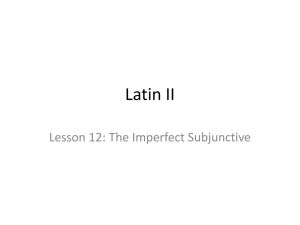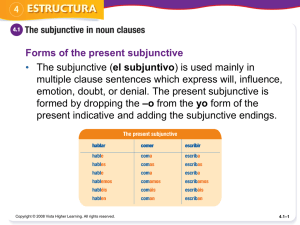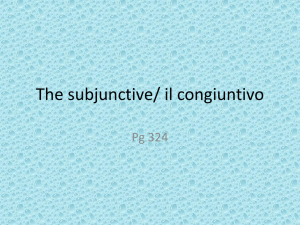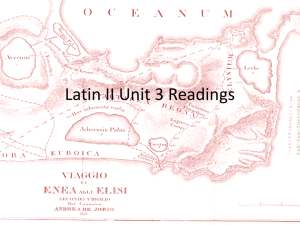+ imperfect subjunctive
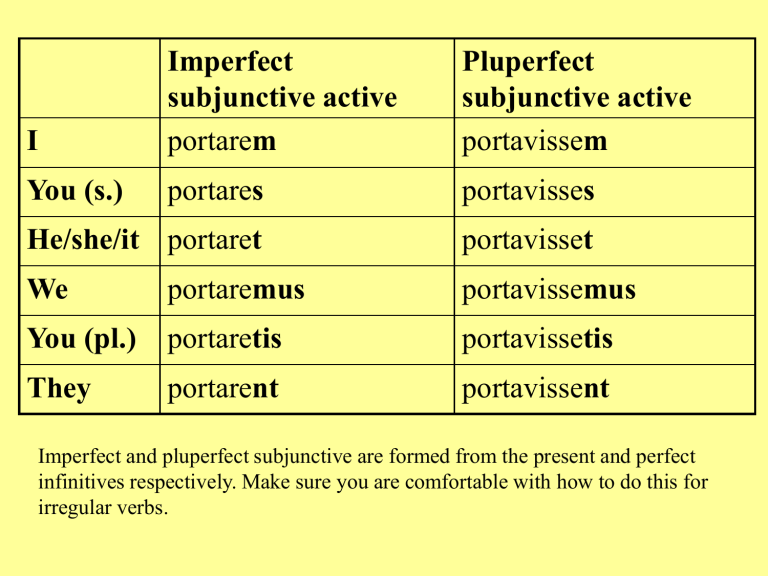
I
Imperfect subjunctive active portare m
You (s.) portare s
He/she/it portare t
We portare mus
You (pl.) portare tis
They portare nt
Pluperfect subjunctive active portavisse portavisse portavisse t m s portavisse mus portavisse tis portavisse nt
Imperfect and pluperfect subjunctive are formed from the present and perfect infinitives respectively. Make sure you are comfortable with how to do this for irregular verbs.
I
Imperfect subjunctive passive portarer
You (s.) portareri s
He/she/it portare t ur
We portare mur
You (pl.) portaremini
They portare nt ur
Pluperfect subjunctive passive portatus esse m portatus esse s portatus esse t portati esse mus portati esse tis portati esse nt
timeret portarem dormires traxissemus mallent adiuvissent amavissem audiretis esset curaret haberent cepissemus habuisset possem
Key Uses of the Subjunctive
• Cum clause
• Result
• Purpose (+ qui to express purpose)
• Indirect question
• Indirect command
• Fear
• Time
Purpose clauses
• A purpose clause describes why someone did something, or the purpose for which they did it
• Purpose clause = ut/ne + subjunctive
E.g. Cicero processit ut diceret
Cicero advanced in order that he might speak
Can you think of a more natural way of translating this sentence?
Cicero processit ut diceret
Literal translation: Cicero advanced in order that he might speak
Alternative translations:
Cicero advanced……
….so that he might speak
….in order to speak
….so as to speak
.…to speak
Some extra things…
• The negative of ut is ne e.g. Cicero processit ne diceret
Cicero advanced in order that he might not speak
• We some times find parts of qui instead of ut – with the same meaning e.g. Cicero processit qui diceret
Cicero advanced in order that he might speak
• Sometimes the purpose clause has a new nominative subject e.g. femina laborabat ut liberi cibum haberent
The woman was working so that her children might have food.
Qui
• What does qui usually mean?
• What does it mean with the subjunctive?
What is the difference between the two sentences?
How should we translate them?
a) misit servum qui regem necavit.
b) misit servum qui regem necaret.
qui + subjunctive = purpose
• milites misi qui ducem hostium necarent.
• senator servum qui equos suos curaret emit.
• misit nuntios qui regem necaverunt.
• ancillas petere constitui quae in villa mea laborarent.
• senex servum habebat qui pueros scelestos terrebat.
• imperatorem tandem invenimus qui hostes vinceret.
An indirect question reports a direct question
• Direct Questions
– ‘Why are you silent?’
– ‘Who is that slave?’
•
Indirect Questions
–
I asked him why he was silent.
–
I wanted to know who that slave was .
What changes when a direct question turns into an indirect question?
Indirect questions in Latin
Introductory + question word
+
subjunctive verb (e.g. who, why) (imperfect = was)
(pluperfect = had)
1) miles rogavit ubi rex habitaret.
2) servi nesciebant cur Caecilius hortum intravisset.
Where is the subjunctive?
Which type?
Where is the question word?
Questions asking for specific information
cur quam quo quantus quot unde quo modo quis qualis ubi quid what sort of who where to how many how why where how/in what way where from what how big
cum clauses
cum + ablative = with cum + subjunctive = when/since
cum
How should we translate cum in each of these sentences?
Watch out for the tense of the subjunctive!
a) senex, cum pecuniam invenisset, ad villam laetus rediit.
b) Belimicus, cum haec audivisset, laetus erat.
c) Belimicus cum multis militibus per oppidum diligenter quaerebat.
d) senex, cum forum ambularet, multam pecuniam invenit.
Consecutive / Result Clauses
• The athlete ran so fast that he broke the world record.
• The child ate so many biscuits that she was sick.
• The elephant was so large that it astonished everyone.
These clauses express the result or consequence of something
The friends drove for two hours so that they could see the sea.
Result clauses in Latin
Sign post word
(in main clause)
+ ut + subjunctive
tam = so adeo = so much tantus = so great tot = so many talis = of such a sort totiens = so often ita = in such a way
Negative: ut + non
Some examples
tam fessus erat ut diu dormiret.
tantas erat tempestas ut omnes timerent.
Quintus carmen ita recitavit ut omnes eum laudarent.
Some examples
tam fessus erat ut diu dormiret.
He was so tired that he slept for a long time.
tantas erat tempestas ut omnes timerent.
The storm was so great that all were afraid.
Quintus carmen ita recitavit ut omnes eum laudarent.
Quintus recited the poem in such a way that all praised him.
• Maecenas tam prudens erat ut Octavianus ei semper confideret.
• litteris adeo studebat ut multos poetas adiuvaret.
• Vergilium tanti aestimabat ut eum in numerum amicorum intimorum acceperit.
• Vergilius Maecenati de Quinto totiens dixerat ut ille Quintum cognoscere vellet.
• cum Vergilius Quintum Maecenati commendavisset, ille tam verecundus erat ut fari non posset.
• haec puella tam fortis erat ut omnes eam laudarent.
• cibus talis erat ut eum edere non possem.
• Britanni erant tam attoniti ut immoti starent.
• adeo esuriebat ut de vita paene desperaret.
Indirect Commands
Asking/commanding verb + ut (or ne) + imperfect subjunctive e.g. imperator milites rogavit ut audirent.
e.g. dux civibus imperavit ut tacerent.
NB impero and persuadeo take the dative.
Time + subjunctive
• dum + subjunctive = until
(with indicative verbs, dum means while) cives in foro manebant dum senator adveniret.
The citizens waited in the forum until the senator could arrive.
• priusquam + subjunctive = before
Time + Subjunctive
1. puer e villa cucurrit priusquam pater adveniret.
2. Romae manebamus dum imperatorem videremus.
3. servus fugit priusquam dominus eum videret.
4. omnem ibum consumpsi priusquam frater eum inveniret.
Fear verbs + subjunctive: followed by ne not ut
1. timebam ne dominus clamorem audiret.
2. puer timuit ne hostis eum inveniret.
3. puer timuit ne inveniretur.
4. timebamus ne imperator nos videret.
5. timebam ne clamores non audirem.
Fear + subjunctive
1. frater meus timet patrem.
2. puer timuit ne hostis eum inveniret.
3. timeo dominum dominamque.
4. timebam ne custos clamores non audiret.
5. ancilla timebat ne Metella eam vituperaret.
NB fear verbs can also be followed by an accusative
How is the subjunctive used??
A silly story illustrating 7 uses of the subjunctive!
• The man went to the stadium in order to see the race.
• He asked what time the race was starting.
• Before he had finished his question, the race was being announced.
• The athlete was afraid that she wouldn ’ t win a medal.
• However, she ran so fast that she won the race.
• When she had won the race, she went out to celebrate.
• She told her trainer to go and celebrate as well.
Which goes with which?
• The man went to the stadium in order to see the race.
• He asked what time the race was starting.
• The athlete ran so fast that she won the race.
• When she had won the race, she went out to celebrate.
• She told her trainer to go and celebrate as well.
cum + subjunctive purpose clause indirect question indirect command result clause
1. servus tam stultus erat ut nihil intellegeret.
2. Caesar milites misit ut murum delerent.
3. dominus servos oravit ut celeriter laborarent.
4. puerum rogavi quid consumeret.
5. cum nihil audivissem, domi manebam.
a) cum + subjunctive b) indirect question c) purpose clause d) indirect command e) result clause
1.
libertus, cum venenum bibisset, mortuus procubuit.
2. tot hostes castra nostra oppugnabant ut de vita desperaremus.
3. principes me rogaverunt cur pontem transire vellem.
• 4. Gutta sub mensa se celavit ut periculum vitaret.
• 5. Caesar militibus imperavit ut fortiter pugarent.
a) cum + subjunctive b) indirect question c) purpose clause d) indirect command e) result clause
Uses of the Subjunctive
Watch out for the tense of the subjunctive!
1. milites misi qui ducem hostium necarent.
2. Belimicus, cum haec audivisset, laetus erat.
3. ancillas petere constitui quae in villa mea laborarent.
4. puer timuit ne hostis eum inveniret.
5. puer timuit ne inveniretur.
6. cum montem ascenderem vulnus severum accepi.
7. senex servum habebat qui pueros scelestos terrebat.
8. timebamus ne imperator nos videret.
9. miles gladium ferebat quo se defenderet.
• Purpose clause
Uses of ‘ut’
The man went to the shops to / in order to / so that he might buy some bread.
How to spot:
Negative:
•
Indirect command.
The master ordered the slave to go to the market.
How to spot:
Negative:
•
Result clause.
The girl ran so fast that she won the race.
How to spot:
Negative:
• With indicative/ no verb = as
How to spot:
Indirect command
Result
Clause
Purpose
Clause ut meaning
‘as’
I ordered the citizens to listen.
The girl ran so fast that she won the race.
I went to Rome so that I might see / to see the emperor.
His name, as he said, is Quintus.
How to recognise in
Latin
Negative

